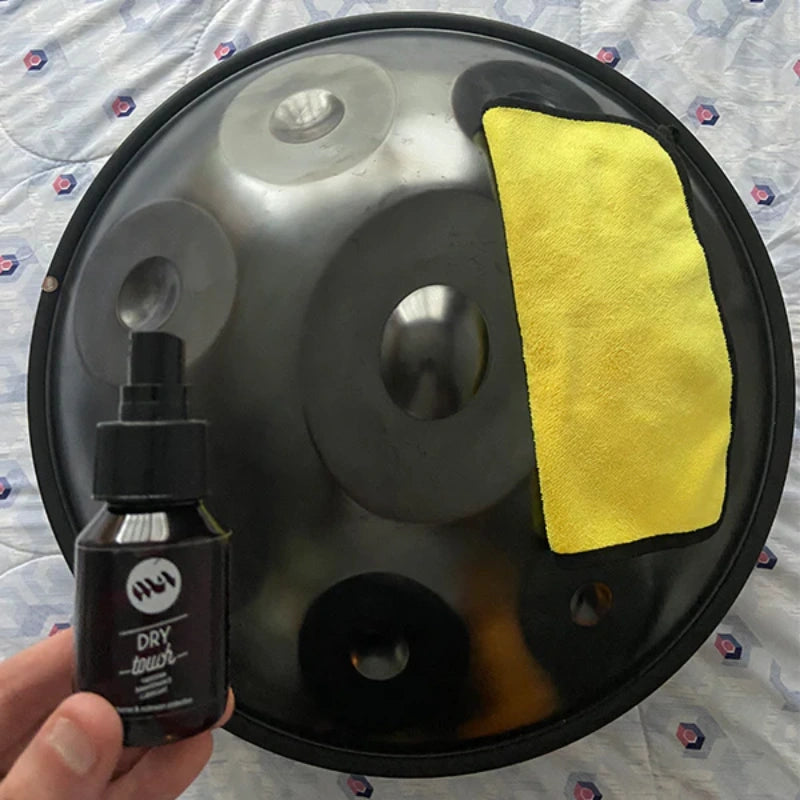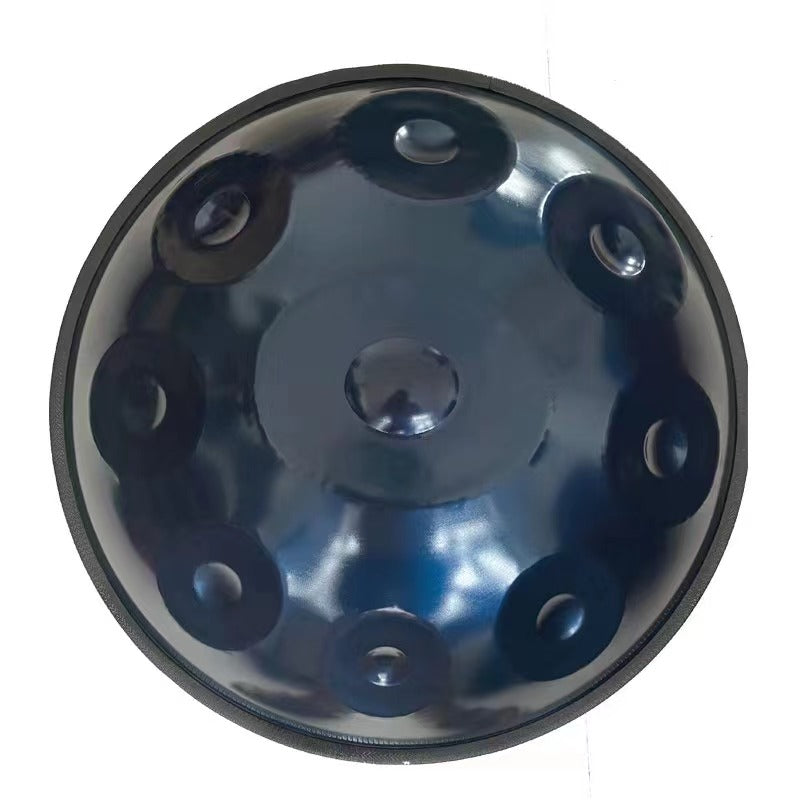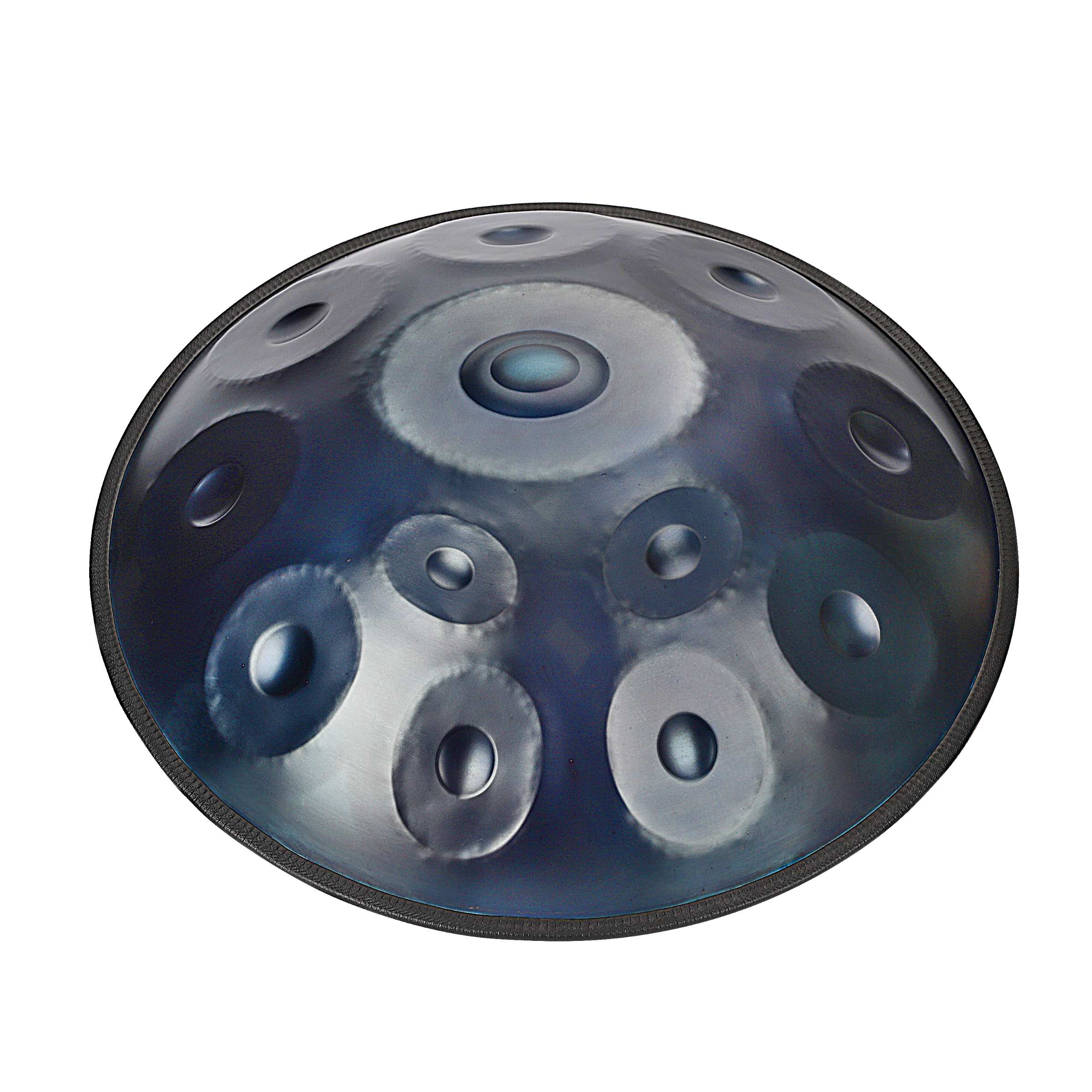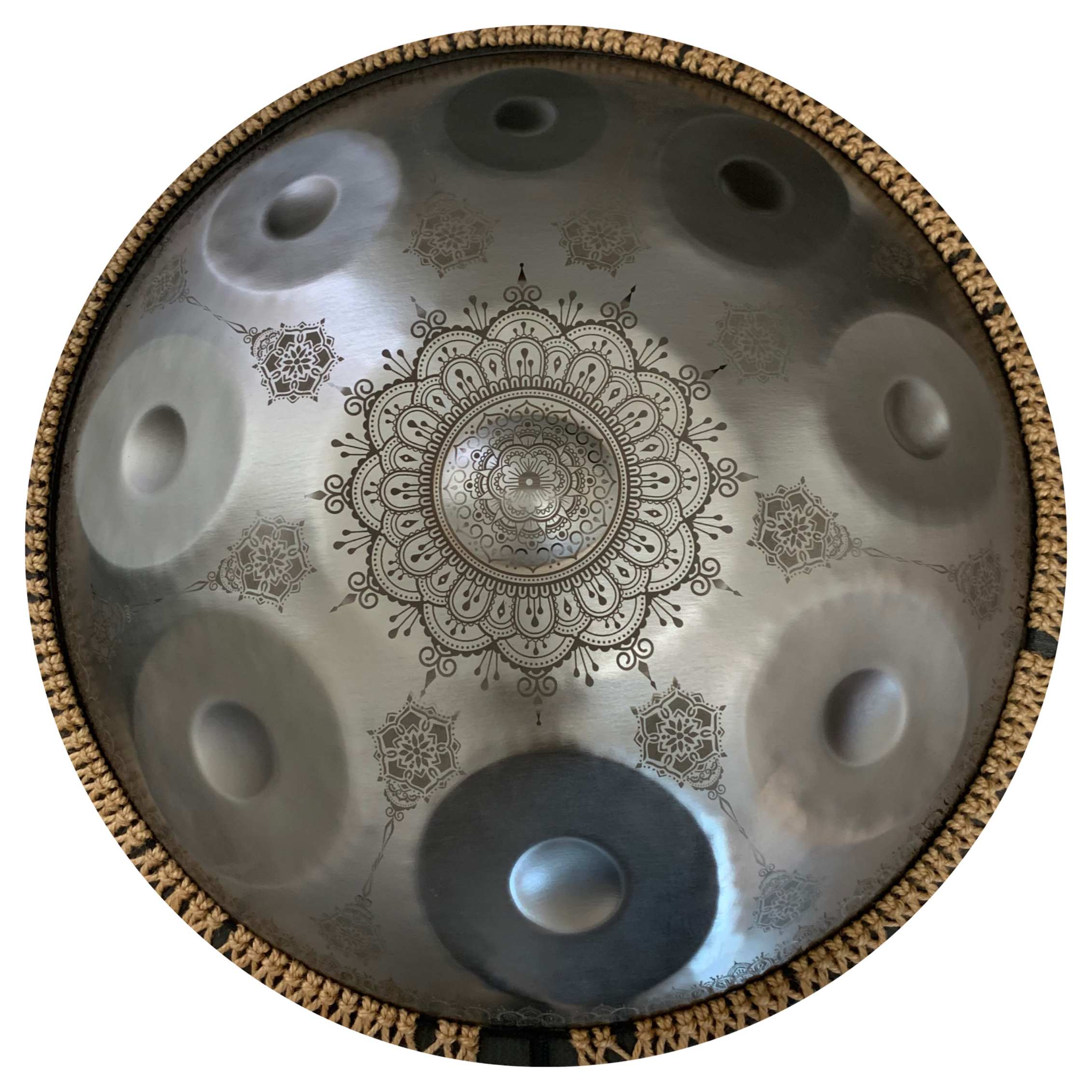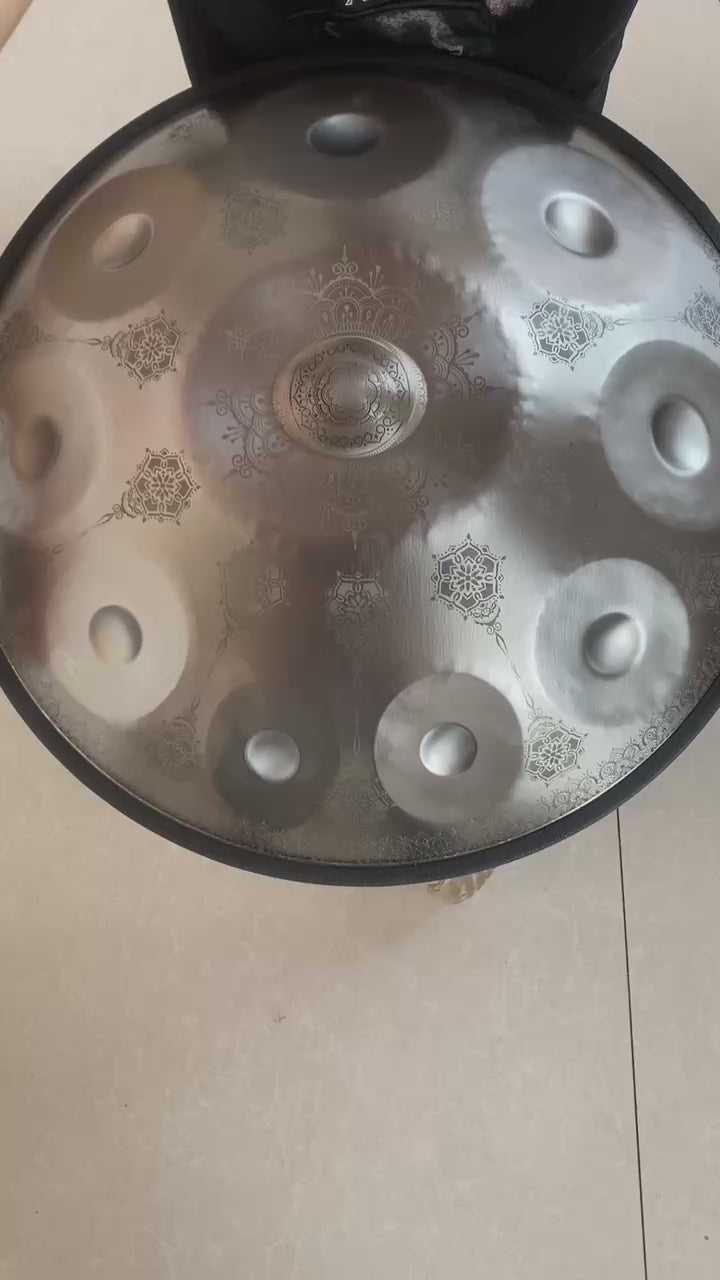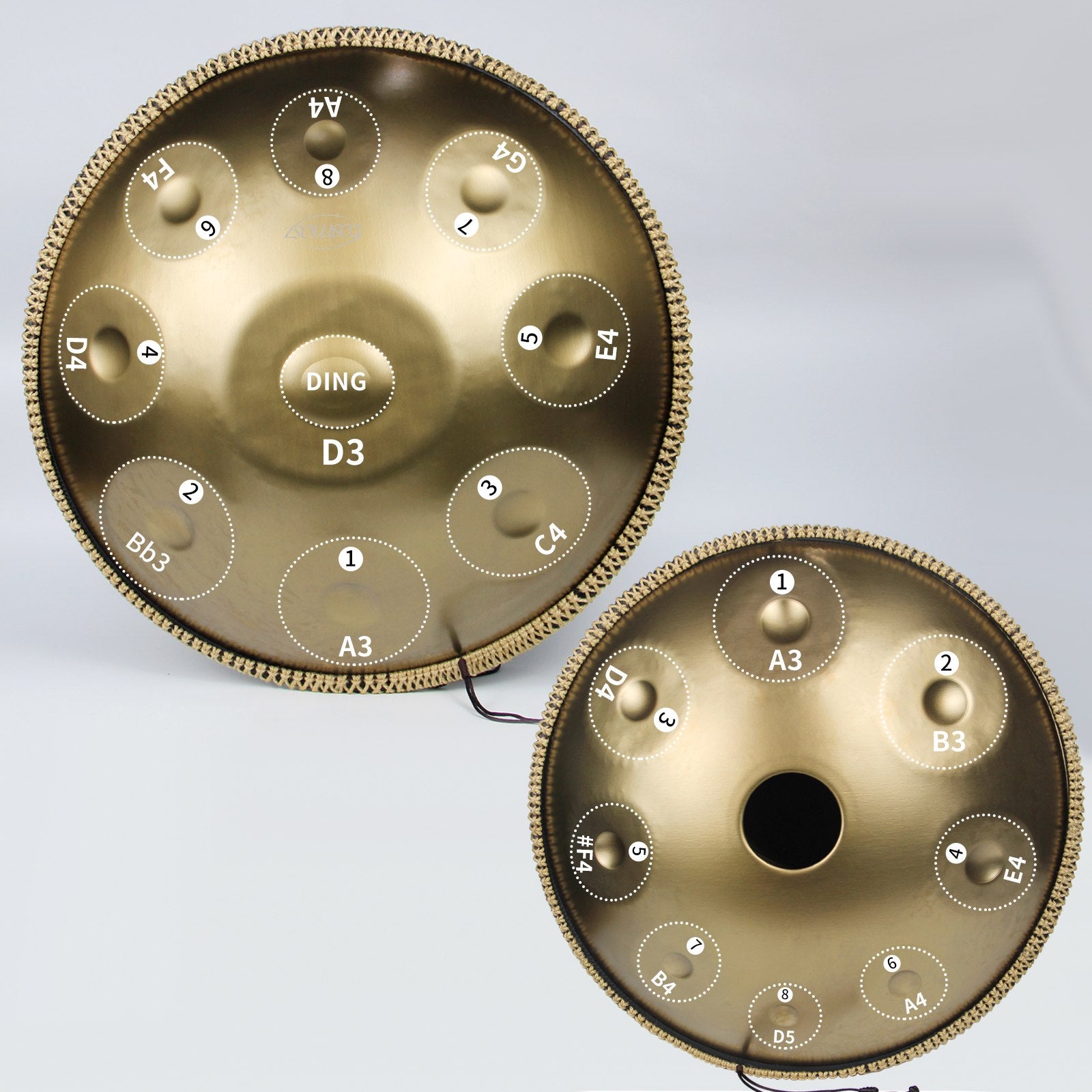This comprehensive article will teach you some easy handpan maintenance tips for proper handling to make your handpan last longer and stay cleaner.

How To Make Your Handpan Last Longer
Due to their distinctive sound and fine craftsmanship, handpans must be carefully maintained to stay in outstanding condition. These instruments must be well-kept to retain durability, tonal quality, and aesthetic attractiveness. By knowing the basics of handpan maintenance, you can preserve your investment and keep listening to the lovely music it makes.
From routine cleaning to handling procedures, understanding the proper approaches can help you avoid frequent problems and prolong the life of your handpan. Following are some tips that you should use to maintain your handpan and avoid any damage:
1.Regular Cleaning
Cleaning your handpan is the most crucial step of all.
Dust Regularly
To gently remove dust and fingerprints from the surface, use a soft, clean, and dry cloth, preferably microfibre. Avoid the use of any abrasive material that may scratch the metal.
Use Alcohol
Periodically, you can use thinned-down rubbing alcohol or surgical spirit on a soft cleaning cloth to thoroughly clean your handpan.
Removing Stubborn Dirt
Use a cloth that has been slightly wet with water to remove any tenacious dirt or residues. Steer clear of too much moisture, and completely dry the instrument afterward.
Deep Cleaning
To clean deeper, use a damp cloth with a trivial amount of mild soap. Wipe the handpan gently and dry it using a clean cloth to block rust.

Moisture poses a severe risk to the durability of your handpan, making it essential to protect it from moisture.
Humidity Level
Keep the storage area’s humidity level steady, as increased humidity may cause rust and metal degradation. Use silica gel packs or a dehumidifier to absorb moisture.
Dry Environment
Keep your handpan out of damp areas like kitchens and bathrooms by storing it in a dry, controlled-humidity place.
Avoid Water Exposure
Under no circumstance should you expose your handpan to rain or high-humidity environments. If it gets wet, dry it thoroughly as soon as possible to prevent rust.
Inspect After Moisture Exposure
After being exposed to moisture, check the handpan for rust or damage, and take quick action to fix any problems you find.
The use of chemicals can seriously damage the metal and affect its sound quality.
No Oils Or Polishes
Keep your handpan away from using oils, polishes, or any other harsh chemicals. Such chemicals can damage the metal and affect your handpan’s tuning.
Use Mild Soap
To clean the handpan, use mild soap and water. Do not use strong detergents or cleaning agents that may harm its finish.
Rust can cause severe damage to the surface of your handpan. So you must avoid it as much as you can.
Apply Oil
You can oil your handpan to protect it against rust. However, it is suggested to consult the maker before applying oil.
Clean And Scour
Cleaning the handpan with a microfibre and scouring it with water and brush can easily remove the rust. You can also protect it further by applying a few drops of organic oil.
Keeping the handpan out of the sun is crucial to prevent it from getting too hot, as this can cause it to go out of tune. Before playing the Handpan and ensuring it is still in tune, ensure it has cooled to room temperature if it ever heats up.
How To Handle And Store Your Handpan
Here are some tips on how you should handle and store your handpan to increase its longevity:
1.Proper Handling
Properly handling the instrument is essential for maintaining its quality.
Clean Hands
Always play your handpan with clean, dry hands to avoid transferring dirt and oils onto its surface.
Gentle Touch
Take care when handling the handpan using less force and avoiding rough treatment.
Protective Padding
Ensure the handpan is well-cushioned if you ever need to move it. This prevents accidental impacts or scratches.
2.Safe Storage
Store your handpan safely in a stable environment to avoid dust or environmental impacts.
Use A Protective Cover
Keep your handpan in a soft, protective cover to prevent dust or accidental impacts when not using it.
Store On A Stand
Put your handpan in a cushioned case or on a padded stand. Steer clear of hard surfaces where it can be bumped or scratched by accident.
Temperature Control
Store your handpan in a stable environment, as extremely harsh temperatures can affect its tuning and metal integrity.
Tuning and Professional Maintenance
Getting your handpan professionally checked is significant for its maintenance. Here are some tips on what you should do:
1.Monitor Tuning
It is essential to keep a check on its tuning.
Listen for Changes
Play your handpan and listen for any differences in pitch or resonance to ensure it is regularly tuned adequately.
Regular Checks
Playing style or environment changes can cause handpans to become out of tune. Check the tuning frequently, and in case of any problems, get advice from a qualified tuner.
Avoid Self Tuning
To tune a handpan, you need specialized knowledge and equipment. It is advised to seek professional assistance if your handpan is out of tune instead of attempting to correct it yourself.
2.Professional Servicing
Serving the handpan professionally is suggested to avoid potential problems.
Routine Inspections
To take care of any possible difficulties, such as rust, damage, or tuning problems, schedule routine professional inspections.
Prompt Repairs
To prevent further damage, have your handpan timely repaired by a professional as soon as it sustains any damage. Timely repairs can maintain the instrument’s quality.
Timely Repairs
To avoid future difficulties and ensure that the handpan stays in outstanding condition, take immediate action to address any damage or tuning issues.
Playing Techniques
Here are some techniques to maintain your handpan’s quality and longevity.
1.Correct Playing Technique
Proper Posture
Maintain good posture and a comfortable playing stance to spare the handpan from needless strain.
Finger Technique
Use the pads of your fingers instead of your nails to strike the handpan. This technique helps avoid dents and scratches.
2.Avoid Overuse
Stay away from using your handpan overly to sustain its state.
Balanced Playing
Avoid excessive or prolonged playing sessions that may lead to wear and tear. Allow the instrument to rest between sessions to maintain its condition.
Environmental Factors Affecting Your Handpan
The storage and playing environment of your handpan has significantly influenced its state. Environmental elements can impact the metal’s integrity and the instrument’s tuning. This includes:
Air Quality
Your handpan may deteriorate due to poor air quality, including pollutants like smoke, dust, and industrial fumes. These impurities may land on the metal surface of the handpan, causing corrosion or degrading its finish. This is why it is essential to maintain a dust-free, clean environment for your handpan. To prevent dust buildup, clean the space where the handpan is kept regularly. Avoid smoking and using harsh chemicals close to the handpan.
Direct Sunlight
Your handpan’s metal may heat up due to prolonged exposure to direct sunlight, resulting in uneven expansion and possible damage. UV radiation can cause fading or discoloration to the instrument’s finish. Keep your handpan out of the direct sun. To regulate the amount of sunlight entering the room where the handpan is kept. Using a cover or protective case, you can use blinds or curtains to protect your handpan from the sun while in transit.
Seasonal Considerations
The temperature and humidity changes with the seasons may affect your handpan. Due to the dry interior air produced by heating systems, winter can be harsh. However, summer might bring in higher humidity levels. To protect your handpan from these changes, you can use a humidifier in the winter to keep the air from being too dry. Monitor humidity levels in the summer and use dehumidifiers as needed. Take the initiative to inspect your handpan for any signs of seasonal decline.
Geographical Location
Depending on where you live, environmental influences can have different effects. For example, rust production can be accelerated in coastal places with high salinity levels in the air. At the same time, metal brittleness may result from desert climates. Consider the local environmental conditions when altering your care and maintenance methods. If you live in a coastal area, use rust inhibitors and frequently clean your home to prevent salt exposure. Ensure you take proper care of the humidity levels in arid climates.
Protective Measures for Long-Term Care
To keep your handpan functioning and beautiful for a long time, you must protect it. By putting in place strong protection measures, you can help keep the instrument secure from harm caused by external conditions, collisions, or normal wear and tear. Here is a thorough look at how to safeguard your long-term care handpan:
1.Protective Cases and Covers
Protecting your handpan requires the fitting covers and cases to prevent any damage on its surface.
Choosing the Right Case
Purchase a well-made, padded case made especially for handpans. Choose instances with lots of padding to protect your handpan against scratches. A well-made case should securely fit your handpan to reduce movement and potential damage when storing or transporting it.
Using a Cover
If a case is unavailable, use a soft, protective cover when your handpan is unused. A cover prevents dust and accidental scratches. Choose a cover made from a gentle, non-abrasive material that will not damage the handpan’s surface.
2.Environmental Controls
Controlling the storage environment of your handpan is essential for its maintenance.
Temperature Regulation
Keep your handpan in a place with a consistent temperature. The expansion or contraction of metal due to extreme temperatures may impact structural integrity and tuning. Keep your handpan out of direct sunlight, air conditioners, and heaters.
3.Handling Precautions
Handling the handpan with care also contributes to its long life and cleanliness.
Gentle Handling
To avoid getting oil or dirt on the metal, always handle your handpan with dry, clean hands. While handling the instrument, using both hands to maintain a balanced weight distribution lowers the possibility of unintentional drops or collisions.
Avoiding Abrasive Materials
Avoid using abrasive materials or products that could scratch or damage the surface when cleaning or using the handpan. Use mild cleaning agents and towels that are lenient.
4.Transportation Considerations
Transporting your handpan with care and security is a point to remember for its additional maintenance.
Safe Transport
Use a travel-ready, well-cushioned case to carry your handpan. At the same time, you are traveling an extended distance with more padding or protection to shield the instrument from potential collisions.
Avoiding Extreme Conditions
Avoid exposing your handpan to high or low humidity or temperatures while transporting it. When taking a flight, ensure the handpan is not kept in a cargo hold with less control over humidity and temperature.
For more tips on maintaining your handpan, check out this video:
Conclusion
Properly maintaining your handpan will guarantee that it stays a lovely and helpful tool for many years. Properly maintaining your handpan will help prolong its lifespan and maintain the quality of sound it produces. If you ever buy a handpan drum for sale, consider using the abovementioned tips for its maintenance.
Maintaining your handpan strengthens your bond and makes it more durable. Your admiration for the beauty and skill that went into making the instrument is evident in every maintenance task. This meticulous maintenance enhances your playing experience and preserves the best possible condition for your handpan.
After all, you will have a lifelong supply of musical inspiration if you put in the time and effort to keep your handpan in good condition.

